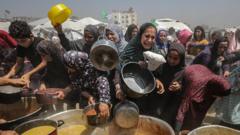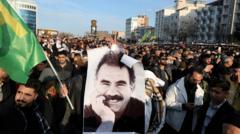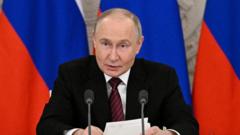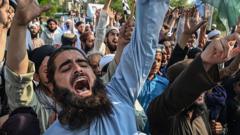While the PKK's decision marks a significant step towards ending decades of violence in Turkey, skepticism and calls for promises loom among the Kurdish community, as many await definitive signs of governmental goodwill and compromise.**
PKK's Historic Disbandment Sparks Mixed Emotions in Turkey's Kurdish Community**
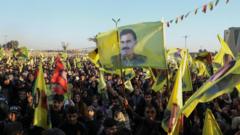
PKK's Historic Disbandment Sparks Mixed Emotions in Turkey's Kurdish Community**
A cautious optimism emerges as the PKK announces its intention to disband, setting the stage for potential peace in a long-standing conflict.**
After four decades of conflict that claimed 40,000 lives, the Kurdistan Workers Party (PKK) has announced its intent to disband in a move that could signal the end of one of the world’s longest-standing internal conflicts. Abdullah Ocalan, the jailed leader of the PKK, urged the group to disarm back in February, but skepticism prevails among many in the Kurdish community regarding the government's sincerity in addressing their long-standing grievances.
In Diyarbakir, regarded as the center of Kurdish culture in Turkey, the responses to the PKK’s announcement were varied. While government officials marked this decision as a stride towards eradicating terrorism, locals expressed uncertainty over what the future holds. Necmettin Bilmez, a 65-year-old driver, voiced his doubts, indicating that without official recognition of Kurdish identity, he remains unconvinced about peace prospects. A contrasting viewpoint emerged from 80-year-old Mehmet Ek, who expressed hope for an amnesty for PKK fighters and the release of imprisoned Kurdish politicians, believing that these steps could usher in lasting peace.
The scars of the earlier confrontations linger in Diyarbakir, which witnessed intense fighting between the PKK and Turkish forces. Many locals are weary from decades of violence and are united in their desire for an end to further bloodshed. Ibrahim Nazlican, 63, lamented the losses on both sides, asserting that no one has truly benefited from this conflict.
Calls are growing for the release of Ocalan, who has been incarcerated since 1999. Supporters argue that his freedom is essential for securing a peaceful future for the Kurdish population, which constitutes roughly 20% of Turkey’s citizens. Menice, a grieving mother whose son was killed in conflict, believes Ocalan's release could symbolize the start of a new era for Kurds in Turkey. She, along with other families, yearns for peace and is weary of the systemic violence.
Despite the stark realities, some political observers note that both the PKK and the Turkish government seem motivated to negotiate for peace amid shifting regional dynamics, providing a glimmer of hope that this historic disbandment could pave the way for a peaceful resolution to a conflict that has cost so many lives.


